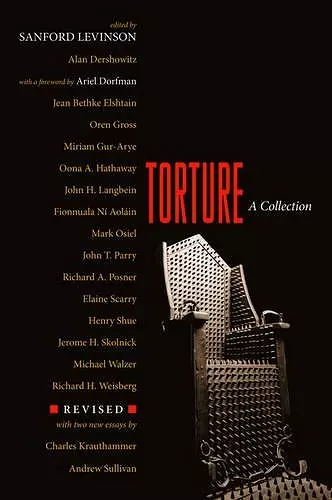Torture
A Collection
Format:Paperback
Publisher:Oxford University Press Inc
Published:24th Aug '06
Currently unavailable, and unfortunately no date known when it will be back

Torture is perhaps the most unequivocally banned practice in the world today. Yet within six weeks after September 11, articles began appearing suggesting that torture might be "required" in order to interrogate suspected terrorists about future possibilities of violence. The United States and some of its allies are using methods of questioning relating to the war on terrorism that could be described as torture or, at the very least, as inhuman and degrading. It is known that the United States sent some suspected terrorists to allied countries that are well known to engage in torture. And in terror's wake, the use of such methods, at least under some conditions, has gained some prominent defenders. Torture: A Collection brings together leading lawyers, political theorists, social scientists, and public intellectuals to debate the advisability of maintaining the absolute ban on torture and to reflect on what it says about our societies if we do--or do not--adhere to it in all circumstances. One important question is how we define torture at all. Are "cruel and inhumane" practices that result in profound physical or mental discomfort tolerable so long as they do not meet some definition of "torture"? And how much "transparency" do we really want with regard to interrogation practices? Is "don't ask, don't tell" an acceptable response to those who concern themselves about these practices? Addressing these questions and more, this book tackles one of the most controversial issues that we face today. The noted contributors include Ariel Dorfman, Elaine Scarry, Alan Dershowitz, Judge Richard Posner, Michael Walzer, Jean Bethke Elshtain, and other lawyers from both the United States and abroad.
"This superior collection of essays by 17 leading scholars provides a timely, penetrating investigation into this morally challenging but important topic.... It is a pleasure to read an edited book in which the chapters speak to each other. This is a well-crafted study in political ethics."--Choice
"What's most striking about these essays is that despite their abstract and theoretical content, they generally do not contradict the depiction of actual interrogators.... The wall between the liberal campus and a conservative, utilitarian-minded military breaks down because the questions are so serious that few of this book's contributors want to engage in polemics, and few--to their credit--ever seem completely comfortable with their own conclusions."--The New York Times Book Review
"These 18 essays from lawyers, political theorists, and social scientists, include contributions from Alan Dershowitz, Ariel Dorfman, and Richard Posner. Edited by University of Texas Law School professor Sanford Levinson, the book is comprehensive and thought-provoking. Levinson divides the essays into four sections. The first, 'Philosophical Considerations,' includes an essay by Michael Walzer, who explores the notion of 'dirty hands'--how leaders remain faithful to moral principles. In the second, 'Torture as Practiced,' authors write about the history of torture in the United States, Europe, and South America. The third section, 'Contemporary Attempts to Abolish Torture Through Law,' explores the Israeli General Security Service's interrogation methods. In the last, 'Reflections on the Post-September 11 Debate About Legalizing Torture,' Dershowitz, Posner, Elaine Scarry, and Richard Weisberg debate torture in the 21st century.'--The American Lawyer
"Conceived wll before the Abu Ghraib story broke, Levinson's collection of essays by philosophers and lawyers provides a cooler, though not dispassionate, look at the issues surrounding torture. Contributors include Jean Bethke Elshtain, Richard Posner, Michael Walzer, and the inevitable Alan Dershowitz.... The collection considers the conditions under which torture might nonetheless be acceptable--notably, the 'ticking bomb' scenario, when the quick extraction of information can save many lives. Dershowitz argues that the normative case against torture remains strong but that under such conditions inhibitions will be overcome--and that it is best that any torturous interrogation be explicit and controlled. His critics denounce such a move as bringing torture into the realm of the legitimate. Other problems are raised, such as identifying the point at which pressure becomes torture."--Foreign Affairs
"Closely argued, well written, and quite readable, these essays jointly constitute a valuable contribution to the field. Recommended for all libraries."--Library Journal
- Winner of Named a Choice Significant University Press Title for Undergraduates, 2004-2005.
ISBN: 9780195306460
Dimensions: 156mm x 235mm x 23mm
Weight: 513g
352 pages